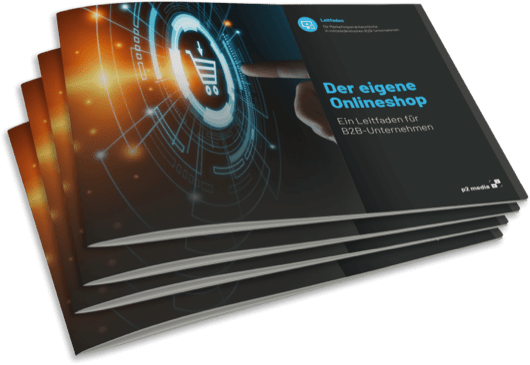According to the regular study by ARD and ZDF on web use in Germany, 94 percent of the population currently use the internet. 72 percent are online every day - and the trend is rising. On average, Germans spend around 3.5 hours a day on the Internet to find information about goods and services.
In view of these developments, a company's own website is therefore an important point of contact, as companies without a (good) website are simply much less likely to be found or considered as partners by customers. The own company website is therefore also an important economic factor. It can be used to convincingly present the respective offers, generate trust, provide support, sell, carry out branding, promote strong long-term business relationships and achieve many other advantages.
However, all these possible benefits only come into play if you operate a website that is precisely tailored to your goals and your target groups. What this means exactly and which criteria ensure a good and successful website, we have compiled for you below.
The most important criteria for a good website
If you consider the following success factors when creating or relaunching your website, you'll be well on your way.
Creating a successful website starts on a technical level. If you focus on a concise domain that represents your company in the best possible way, your chances of having people visit your pages increase significantly. The domain can generate curiosity and trust at the same time.
It's a similar story with security features - especially the use of an SSL certificate. If one is not present, modern browsers will even issue a security warning before the website in question. This would not only have a very negative impact on visitor numbers, but ultimately on the perception of your entire brand.
Not to forget: The presence of an SSL certificate is absolutely SEO-relevant today and one of the ranking factors officially published by Google.
Web users usually have little time. They want answers to their questions as quickly and directly as possible. Therefore, when visiting your website, it should already be clear after a few seconds that your company can contribute to the solution of a specific problem or wish. Otherwise, they will promptly look at your competitors.
Answering the W-questions (Who? What? When? Where? Why? How? What for?) in the content of each page of your website can increase the chances of a claim (of what? Is the company meant in its entirety? If so, I'd write it that way - I'd find a claim of sub-pages strange) significantly increased. And the more your pages are used the better their ranking on Google will be.
Today's users expect websites to work in all major browsers and screen resolutions. You should ensure that your target group has no problems using your web offer.
Typical criteria for accessibility are text alternatives, such as images and videos, a uniform design and advantageous structures, a suitable contrast ratio and meta information. Especially the latter also form an important ranking factor for Google.
Today's web users are particularly looking for information that helps them solve specific challenges or needs. Content that does just that is particularly relevant and is therefore used intensively, which in turn makes up a significant part of the success of a website.
Here, the focus should also be on comprehensibility. Ideally, the wording of the respective target group is adopted exactly. Difficult technical terms should generally be kept to a minimum, as they can even make it difficult for corresponding professionals to understand the context. If you want to build up rankings with your website for certain technical terms, it is advisable to combine the technical term with the wording of your target group. This also applies to text entries such as a search function.
Many people who move around on the Internet are looking for orientation - and not only on the information level, but also with regard to the use of corresponding online offers. Call-to-actions (CTA) take on an important task here: They (ideally) tell visitors to a website what to do in the next step. Of course, they can be used in a first-class way to guide (potential) customers closer to the purchase decision.
Interaction opportunities are often associated with CTAs. For example, visitors are invited to leave a comment or use the contact form to request a quote. Interactions are very relevant on a website in that they are associated with many typical conversions. However, they are also capable of significantly increasing the intensity of web usage. Last but not least, they also promote the chances of a good ranking.
Usability is on everyone's lips as a success factor for websites. No wonder, because even an internet presence, no matter how attractively designed and equipped with the most relevant information, will of course never reach its full potential if it is not well usable.
A good company website, on the other hand, allows visitors to easily and quickly get to exactly the facts or features that are needed. This, in turn, is usually rewarded by heavy usage. For Google, this is a signal for a good user experience (UX), which can contribute significantly to the optimization of the ranking.
Web design, usability and user experience are inextricably linked. Of course, the design should always be unique in order to create a unique position - but it should also not deviate too much from the habits of the target group and should be easy to use according to the usability criterion.
If the web design is right, this usually has a great influence on the positive design of the UX - and this in turn has a beneficial effect on the perception of your brand and of course again on your SEO.
In fact, a fast loading time is one of the most important criteria for a good website. Here again, the typical hurry of today's Internet users plays a major role. If a page takes longer than two seconds to load, a significant number of users jump straight off again.
With fast loading websites, on the other hand, more pages are called up on average in the course of a session, which of course means an increased chance of achieving the targeted conversions. Last but not least, Google also rates pages with a high PageSpeed positively.
Those who search the web for solutions to wishes or problems actually do so particularly frequently via Google. The search engine giant has a market share of more than 93 percent in Germany. The fact that SEO is decisive for the success of a website does not need to be explained further with this factual situation.
As you have already noticed, almost all of the preceding success factors for a good website are also SEO-relevant in one way or another - and this also applies to the following ones.
The use of mobile devices continues to increase steadily. (also in the B2B context) According to Statista, the share of mobile internet users is currently at 80 percent. As a result of this development, Google today actually only accepts the mobile variants of websites for its evaluations. Quite similar to the previously described criterion of search engine optimization, these developments speak for themselves in terms of website success relevance.
The term "user centricity" describes a concept that focuses on the users of a website and not on the goods or services sold by the respective company in general. By adopting a corresponding centricity, the starting point of the value chain shifts towards the (eventual) customer.
Such an attitude naturally forms a particularly fertile ground for a good website design that precisely serves the needs of the respective target group.
A good website makes it easy for visitors to contact the company. If communication is sought, this means a lead for you, an actual interest in your distributed goods or services, which you should take advantage of, and increased chances of closing a deal.
It is imperative to consider the specific requirements of your target audience here. Does your target audience prefer to use the phone or perhaps live chat, WhatsApp, etc. are in demand in your field? If you offer exactly the contact options that your target customers want, they will actually use them more.
Full compliance with the GDPR is, of course, absolutely necessary on a legal level. Otherwise, there is a risk of severe warnings and other negative legal effects.
On the other hand, a strategically clever handling of the corresponding guidelines can also contribute to your website being used more and your branding being pushed. To do this, be transparent for your visitors and try to keep the barriers in the cookie settings as low as possible.
- Define goals of a website (SMART) Without setting goals, you have effectively no clue whether your web pages are successful or not. A website can have a wide variety of goals: Is it to increase the reach of your brand, sell directly, generate leads, create product awareness, or all of the above? When setting goals, it's a good idea to use the SMART model. This is an acronym of the terms "Specific", "Measurable", "Attainable", "Relevant" and "Time-bound". Accordingly, your goals are ideally clear, measurable, realistic, important to your business, and achievable within a specific timeframe.
- Determine target group and establish buyer persona It goes without saying that it is extremely important to precisely determine your website's target group, otherwise you will hardly be able to work efficiently towards meeting their expectations. Ideally, you should create buyer personas. The buyer persona approach uses socio-demographic data, typical actions, psychological characteristics and/or media affinities as well as very personal factors, such as possible professional and private challenges, and other details. This gives your target group a concrete face, allowing you to tailor the content of your website very precisely to them.
- Keyword analysis Relevant content is extremely useful. But how do you find out which content is really important? In most cases, the answers come from a good keyword analysis. In the course of this, you find out what your target group is searching for on Google. In addition, it is clarified for each keyword which search intentions are to be served with it.
- Content strategy You should, long before you start producing content, set up a suitable strategy for your content. Keep in mind that your (potential) customers are also using the internet more and more to get information that really helps them solve specific problems or wishes. If you are instrumental in addressing these with your content, chances increase that your company will eventually be chosen for the solution. So, you can benefit greatly if you provide your target audience with the appropriate content or content that truly adds value in the respective context throughout the entire customer journey. To achieve this, you should be guided by the following questions:
- For whom is the content written?
- Which problems or wishes should be solved with the content?
- Can visitors be offered added value that they do not expect?
- Which central questions does my niche currently face?
- What do (potential) customers ask most often?
- Choosing the right CMS The market today offers a huge range of content management systems (CMS). WordPress is the absolute top dog here. The CMS has a market share of more than 60 percent - and for good reason: WordPress is characterized by high cost efficiency, flexibility and end-user friendliness. This makes the system suitable for almost any website project. Ultimately, you should choose a system that can serve your needs comprehensively and optimally. It should also be easy for you or your team to use.
- Choosing the right provider Although you can ensure that all the criteria for a successful website are taken into account or implemented within the company, this is only really useful in the rarest of cases. The realization of a good website means a lot of effort, for which even companies with a marketing department hardly have time. Many other important to-dos have to fall by the wayside. In addition, internal specialists often have a less clear view of the company - they move within proven structures and follow specific corporate values that may have become ingrained over decades. This can stand in the way of necessary innovations. An external partner, on the other hand, works efficiently, objectively and ultimately almost always more cost-effectively than would be possible internally. In order to find the right provider, you should pay particular attention to the fact that they are able to implement all the criteria listed here precisely and that they are transparent and customer-oriented.
Entwicklung einer erfolgreichen Webstrategie
Ein Website-Projekt sollte für eine effiziente Abwicklung stets auf einer spezifischen Strategie basieren. Nachfolgende Punkte sind hier elementar.
Optimization of the current website
Once a good website has been created, the work is far from over. In order to achieve long-term success with an Internet presence, it must be continuously maintained and updated.
Continuous updates of the content and web applications, regular backups and security checks ensure a high-quality website in the long term. Among other things, all this increases the trust of visitors.
Up-to-date HTTPS encryption with SSL certificate prevents browsers from issuing a warning when visiting your website.
SEO is always an ongoing process. If your website or individual pages of it have once made it to number one in the Google ranking, this does not mean that they are guaranteed to stay there. Be sure: your competitors are doing everything they can to take the top spots away from you.
Accordingly, you should constantly evolve your SEO. In particular, keep an eye on the expectations and needs of your target audience, monitor what your competitors are doing in terms of SEO, and keep track of general SEO trends, technical innovations that influence SEO, and adjustments to Google's algorithms. Transfer all this to your search engine optimization.
Content marketing is one of the most important keys for a long-term successful website. If you always provide your (potential) customers with exactly the content they expect or need and also serve them with added value on top of that, the chances increase enormously that your website will be visited again and again by your target group and used intensively.
This in turn does not go unnoticed by Google, which can significantly increase your ranking. This results in an increasing reach, which contributes to the fact that once again more people become aware of your online offers.
CONCLUSION: How to make your company website a success
In all of the success criteria and strategic considerations listed here, you should keep your target group firmly in mind. Keep in mind that these efforts can only reach their full potential if you focus on the right people.
Offer them real added value and avoid pitfalls. This way, you will convince your visitors and Google alike.
We are happy to support you in making your online presence competitive and future-oriented:
- How does your website compare to your strongest competitors? We would be happy to conduct a free TYPO3 upgrade check for you and define a success-oriented target alignment together with you.
- In this context, we will advise you with our extensive know-how on the topics of user experience and user guidance on your website and help you to deliver an optimal experience to your customers.
- Our experienced web developers will be happy to implement your individual wishes - be it the development of extensions, responsive websites, apps orinterface connections.
- Need a new website? No problem. Together we will find the right content management system for you and start from scratch.
- Our support team is always available for technical and editorial support as well as regular training.
For a successful and comprehensive online strategy, we are also happy to advise you on the following topics:
Oliver Parrizas will be happy to answer any questions you may have on the subject. +49-800-911-91-91












